The Order of the White Feather
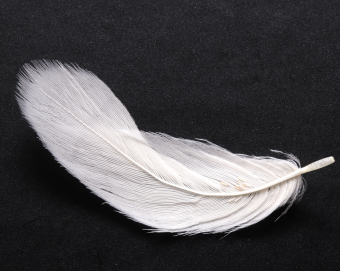 The commonly held notion that WW1 was started out of outrage over the assassination of Archduke Franz Ferdinand of Austria and his wife Sophie at the hands of the Serbian nationalist secret society known as the “Black Hand” isn’t entirely correct. In fact, the Emperor Franz Josef himself expressed relief over the assassination because it rid him of an heir that he deeply disliked. The Emperor commented that “God will not be mocked. A higher power had put back the order I couldn’t maintain.”
The commonly held notion that WW1 was started out of outrage over the assassination of Archduke Franz Ferdinand of Austria and his wife Sophie at the hands of the Serbian nationalist secret society known as the “Black Hand” isn’t entirely correct. In fact, the Emperor Franz Josef himself expressed relief over the assassination because it rid him of an heir that he deeply disliked. The Emperor commented that “God will not be mocked. A higher power had put back the order I couldn’t maintain.”
It wasn’t just the Emperor who was relieved; it was reported by an Austrian newspaper that the general consensus among the various political circles was that the assassination, though a tragedy, was for the best. As far as the Austrian people were concerned, it was noted “The event almost failed to make any impression whatever. On Sunday and Monday, the crowds in Vienna listened to music and drank wine as if nothing had happened.”
So why go to war over an assassination if nobody cared? Because, while nobody seemed to much care about the assassination itself, Austria-Hungary had been looking for an excuse to wage a “preventative war” against Serbia as a state in order to weaken or destroy them so as to take back territory in the Balkans that had been taken during the Balkan Wars. They had not taken it back up to this point because they lacked Germany’s support; without that support, they feared Russia too much. (Russia had a treaty with Serbia.)
With the assassination of Archduke Franz Ferdinand and his wife on June of 1914, Austria-Hungary was able to secure the promise from Germany that it would aid in a war with Serbia and possibly Russia, if Russia chose to enter the fray. It should be noted here that Austria-Hungary did not really expect Russia to enter the fight as they expected this to be a very small war that would be over quickly before Russia would feel obligated to respond.
Now with Germany’s support if Russia did enter the war, Austria-Hungary issued an ultimatum to Serbia with remarkably severe terms that Serbia would be sure to reject, thus giving Austria-Hungary an excuse to go launch a limited war on Serbia to reclaim territory in the Balkans. Surprisingly, Serbia responded relatively well to the ultimatum, but they did dispute a few clauses, giving Austria-Hungary the excuse they needed to go to war. At this point, the following general series of events happened due to a variety of existing treaties between various nations, escalating this minor clash into the first “Great War”.
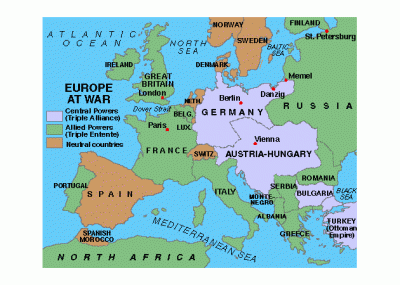 Russia, bound by their treaty with Serbia, decided to come to Serbia’s aid.
Russia, bound by their treaty with Serbia, decided to come to Serbia’s aid.- Germany, with the recent treaty with Austria-Hungary, declared war on Russia.
- France, bound by an existing treaty with Russia, now was at war with Germany by association. Germany then invaded neutral Belgium to have easy access to France.
- Britain, allied with France with an existing treaty, declared war against Germany. This was unexpected by Germany as they thought Britain would stay out of the war due to the fact that the treaty with France was loosely worded and not entirely binding. However, Britain also had a 75 year old treaty with Belgium. So because of both of these treaties, they decided to declare war on Germany.
- With Britain now warring with Germany, Canada, India, Australia, New Zealand, and South Africa were obligated to enter the war as well.
- Japan then honored an existing treaty with Britain and declared war on Germany.
- Austria-Hungary declared war on Japan for declaring war on Germany.
- The U.S. tried to stay out of the war but in 1917 decided to enter due to Germany’s submarines hindering the United States’ commercial shipping. (The U.S. was shipping a lot of supplies to the Allies.)
So in the end, a minor land dispute turned into a lengthy war that resulted in the deaths of over 17 million people, with another 20 million or so wounded. (The tail end of the war was also around the same time the Spanish Flu was killing 50-100 million- yes million- people and infecting roughly 1 in 4 humans. At the same time, the mysterious encephalitis lethargica epidemic was killing about one million more and leaving countless others as human paperweights.)
While the war may have started for petty reasons, the danger to those on the home front was very real. Edward Thomas, the inspiration for the famous poem “The Road Not Taken”, noted of this:
a sky of dark rough horizontal masses in N.W. with a 1/3 moon bright and almost orange low down clear of cloud and I thought of men east-ward seeing it at the same moment. It seems foolish to have loved England up to now without knowing it could perhaps be ravaged and I could and perhaps would do nothing to prevent it… Something, I felt, had to be done before I could look again composedly at English landscape…
So while up to this point he had been indifferent to the politics behind the war, he now began to consider that it really didn’t matter what the war was being fought over; if the land and all that was on it was directly threatened, it needed defending if it was to be preserved. (For more on Edward Thomas and why Frost’s point in “The Road Not Taken” is the opposite of what most people think, see: Robert Frost’s Almost Universally Misinterpreted Poem “The Road Not Taken” and the Role it Played in the Death of His Best Friend.)
So what does all this have to do with white feathers? The idea of a white feather being synonymous with cowardice stretches back to at least the 18th century, supposedly from the sport of cock fighting, with the belief that cockerel’s sporting these white feathers were poor fighters. Whether that’s really how the notion started or not, over time a white feather came to be associated with weakness and cowardice in parts of Britain, notably appearing in the 1902 novel The Four Feathers and the 1907 The White Feather.
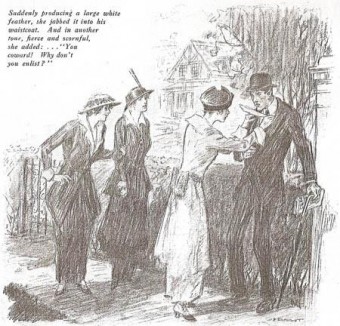 This brings us to August of 1914 when Vice-Admiral Charles Penrose Fitzgerald came up with an idea to bolster recruitment rates (at this point in the war, enlisting was voluntary) – have women present white feathers to any man on the streets who wasn’t wearing a uniform. To help accomplish this goal, Fitzgerald recruited a group of 30 women to hand out the feathers to any man they saw out of uniform in his home town of Folkestone, dubbing the newly formed group “The Order of the White Feather”.
This brings us to August of 1914 when Vice-Admiral Charles Penrose Fitzgerald came up with an idea to bolster recruitment rates (at this point in the war, enlisting was voluntary) – have women present white feathers to any man on the streets who wasn’t wearing a uniform. To help accomplish this goal, Fitzgerald recruited a group of 30 women to hand out the feathers to any man they saw out of uniform in his home town of Folkestone, dubbing the newly formed group “The Order of the White Feather”.
When the British Press got wind of the campaign and reported on it, many women across the country reacted in kind and similarly began handing out white feathers to any man they saw in civilian clothes. This campaign was inflamed by numerous forms of propaganda and rampant rumors about the “Rape of Belgium“, graphically speaking of Germans brutally torturing Belgium women and children and implying the same would happen in Britain if the men of the country didn’t go to war. As one war poster stated, “Britain is Fighting not only for Freedom in Europe, but to defend your mothers, wives, and sisters from the horrors of war!”
In a propaganda poster directed at women, it stated “To the young women of London: Is your ‘Best Boy’ wearing Khaki? If not don’t YOU THINK he should be? If your young man neglects his duty to his King and Country, the time may come when he will NEGLECT YOU!”
These types of campaigns worked remarkably well. Journalist Helen Ball even went so far as to write in 1916, “a husband lying in a rough grave in France is easier to bear than a ‘shirker by your side’.”
On a similar note, in a July of 1915 edition of the Times, one Ethel M. penned a personal column noting, “Jack FG. If you are not in khaki by the 20th I shall cut you dead.”
As the Order of the White Feather grew, it was reported that gangs of young “Feather Girls” would go around handing feathers out to men on the streets. William Brooks noted of this (in an interview he gave in 1993 about why he joined up to fight in WW1 all those years ago),
Once war broke out the situation at home became awful, because people did not like to see men or lads of army age walking about in civilian clothing, or not in uniform of some sort, especially in a military town like Woolwich. Women were the worst. They would come up to you in the street and give you a white feather, or stick it in the lapel of your coat. A white feather is the sign of cowardice, so they meant you were a coward and that you should be in the army doing your bit for king and country.
It got so bad it wasn’t safe to go out. So in 1915 at the age of seventeen I volunteered under the Lord Derby scheme. Now that was a thing where once you applied to join you were not called up at once, but were given a blue armband with a red crown to wear. This told people that you were waiting to be called up, and that kept you safe, or fairly safe, because if you were seen to be wearing it for too long the abuse in the street would soon start again.
James Lovegrove, who was 16 when he joined the war effort, wrote:
On my way to work one morning a group of women surrounded me. They started shouting and yelling at me, calling me all sorts of names for not being a soldier! Do you know what they did? They struck a white feather in my coat, meaning I was a coward. Oh, I did feel dreadful, so ashamed.
I went to the recruiting office. The sergeant there couldn’t stop laughing at me, saying things like “Looking for your father, sonny?”, and “Come back next year when the war’s over!” Well, I must have looked so crestfallen that he said “Let’s check your measurements again”. You see, I was five foot six inches and only about eight and a half stone. This time he made me out to be about six feet tall and twelve stone, at least, that is what he wrote down. All lies of course – but I was in!”
In another example, architect William Weller was the recipient of both a feather and the then somewhat common associated shaming letter. Weller, had been excused from military service due to a combination of illness, being in his 40’s, and the fact that he was helping design and build homes for steel workers. This didn’t stop him from receiving the following note in the mail with an included white feather:
Sir,
Your gallant and protracted defence against the brutal attacks of the local tribunal has been brought to the notice of the Supreme Council of the Most Noble Order of the Trench Dodgers. I am to inform you that the council have therefore, as a reward for your devotion to self regardless of narrow patriotism, made you a companion of the said most Noble Order, the insignia of which is forwarded herewith.
I am. Sir Your obedient servant,
A. Chicken Heart, Clerk of the Council
In a 2008 article published in The Guardian, Francis Beckett told the story of his grandfather who was shamed into fighting in the war and ultimately perished because of it:
He had three small daughters, which saved him from conscription, and his attempt to volunteer was turned down in 1914 because he was short-sighted. But in 1916, as he walked home to south London from his office, a woman gave him a white feather… He enlisted the next day. By that time, they cared nothing for short sight. They just wanted a body to stop a shell, which Rifleman James Cutmore duly did in February 1918, dying of his wounds on March 28.
My mother was nine, and never got over it…. She blamed the politicians. She blamed the generation that sent him to war. She was with Kipling: “If any question why we died, / Tell them, because our fathers lied.” … But most of all, she blamed that unknown woman who gave him a white feather, and the thousands of brittle, self-righteous women all over the country who had done the same…
As you can imagine, since the only criteria for being given a white feather was “not wearing a military uniform at that particular moment” some of the men presented with them actually were soldiers who were either on leave or had been discharged. Unsurprisingly, few soldiers took kindly to being called a coward and reactions ranged from snide dismissal to outright aggression, including one unfortunate incident in which Private Ernest Atkins unchivalrously slapped the woman presenting him with the feather with his military paybook.
Sometimes, however, the campaign was even successful on former soldiers. Case in point- Frederick Broom was a young man of just 15 years of age who managed to convince recruiters he was 19 and fought on the Western Front for a year before contracting a severe fever and being sent home. While enjoying a stroll shortly after his 16th birthday, Broom was accosted by three girls who gave him a handful of white feathers while a gathered crowd chided him for being a coward. He stated, “I explained to them that I had been in the army and been discharged, and I was still only 16. Several people had collected around the girls and there was giggling, and I felt most uncomfortable and … very humiliated.” Broom was so shaken by the experience, he re-enlisted the next day.
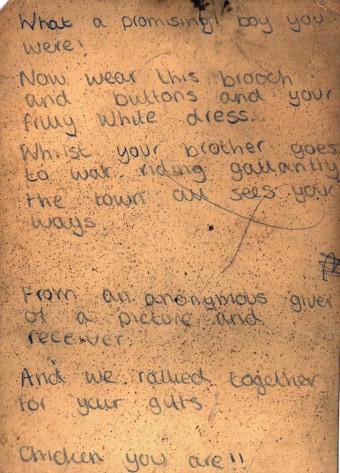 Sadly, this isn’t the only example of a far too young man being shamed into fighting in WW1 and many young men barely out of puberty are reported to have enlisted (or at least attempted to) for this reason. For instance, in another shaming letter incident, an anonymous note was written on the back of what is thought to be a 10 year old boy’s picture:
Sadly, this isn’t the only example of a far too young man being shamed into fighting in WW1 and many young men barely out of puberty are reported to have enlisted (or at least attempted to) for this reason. For instance, in another shaming letter incident, an anonymous note was written on the back of what is thought to be a 10 year old boy’s picture:
What a promising boy… Now wear this brooch and buttons and your frilly white dress. ‘Whilst your brother goes to war (his older brother was 16 at the time and a member of the Royal Field Artillery), riding gallantly, the town all sees your ways… Chicken you are!!
Arguably the most glaring mistake made by the so-called members of the Order of the White Feather was the case of Seaman George Samson who was presented with a feather while he was on his way to a party being held in his honor for earning a Victoria Cross (Britain’s highest medal for gallantry). He earned the Cross by rescuing 30 sailors during the Gallipoli campaign while acquiring for himself more than a dozen bullet wounds in his torso.
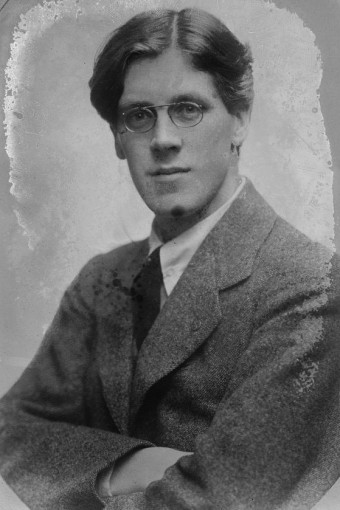 Of course, then there was the likes of famed pacifist and future MP Fenner Brockway who happily noted that he’d received enough white feathers to make a fan. (He was imprisoned during the war for refusing to pay a fine for distributing a leaflet opposing conscription and then later again arrested for refusing to be conscripted. He noted of the latter arrest, “I was taken to the Tower of London and locked in a large dungeon where there were 20 or so prisoners. Six were objectors. I was to be taken to Chester Castle and my wife travelled with me. The Cheshire Regiment did not have a good reputation for its treatment of objectors. The previous week the newspaper had carried reports of how George Beardsworth and Charles Dukes [both subsequently prominent trade union leaders] had been forcibly taken to the drilling ground and kicked, punched, knocked down and thrown over railings until they lay exhausted, bruised and bleeding. I was a little apprehensive…”)
Of course, then there was the likes of famed pacifist and future MP Fenner Brockway who happily noted that he’d received enough white feathers to make a fan. (He was imprisoned during the war for refusing to pay a fine for distributing a leaflet opposing conscription and then later again arrested for refusing to be conscripted. He noted of the latter arrest, “I was taken to the Tower of London and locked in a large dungeon where there were 20 or so prisoners. Six were objectors. I was to be taken to Chester Castle and my wife travelled with me. The Cheshire Regiment did not have a good reputation for its treatment of objectors. The previous week the newspaper had carried reports of how George Beardsworth and Charles Dukes [both subsequently prominent trade union leaders] had been forcibly taken to the drilling ground and kicked, punched, knocked down and thrown over railings until they lay exhausted, bruised and bleeding. I was a little apprehensive…”)
Hundreds of feathers were also given to civil servants, factory workers and a whole host of others who actually were aiding the war effort in some way, shape or form. This became a major problem, but of course the Order was very successful at recruiting, so calls to have Order members arrested were ignored. Instead, the Home Secretary of Great Britain, Reginald McKenna, authorised the government to begin production of various special badges in 1916. For instance, there was the “King and Country” badge, that indicated the man wearing it was aiding in the war effort in some form or other, and then the Silver War Badge, that indicated the individual wearing it had served and been honourably discharged due to wounds or sickness.
This did little to help the conscientious objectors, however, such as Oxford University’s Joseph Kaye, who was quoted in The Courage of Cowards: The Untold Stories of First World War Conscientious Objectors as stating,
How is it possible for a greengrocer say, or a labourer in some small town in Germany, to have any kind of grievance with a shopkeeper or a gardener in… St. Albans for example? They are just ordinary men, working to provide a living for their families. They both want fundamentally the same thing, whichever country they live in, and yet they are being forced to blow one another to pieces with guns and bombs. It’s immoral, plain and simple. And what’s more, the working man on either side will gain nothing from this war, whatever the outcome. Every country involved will be bankrupt by the end of it and who will suffer? Not the men in power, that’s for sure…. If you look at how much Britain has spent on this war already, it’s enough to provide every family in this country with a decent house and a piece of land. Why can the government find money to fund a war, but not provide a reasonable standard of living for its citizens?
If you liked this article, you might also enjoy our new popular podcast, The BrainFood Show (iTunes, Spotify, Google Play Music, Feed), as well as:
- How World War I Helped Popularize the Bra
- The Amazing WWI Christmas Miracle
- Glowing in the Dark, The “Radium Girls”
- From 1860-1916 the Uniform Regulations for the British Army Required Every Soldier to have a Moustache
- Sergeant Stubby: The Most Decorated Dog of WWI
Bonus Fact:
- Chickens were originally domesticated, not for food, but for cockfighting.
- What Started WWI
- A History of the First World War in 100 Moments: White feather for winner of Victoria Cross
- The Four Feathers
- The Courage of Cowards
- “White Feather” Feminism: The Recalcitrant Progeny of Radical Suffragist and Conservative Pro-War Britain
- White Feather Diaries
- The Men Who Would Not Fight
- White Feather women didn’t impress those at the Front
- Rare World War I white feather found in Wolverhampton
- The Guinness Book of Military Anecdotes
- Admiral Charles
- George Samson
- Order of the White Feather
- Fenner Brockway
- The White Feather Girls
- Rape of Belgium
| Share the Knowledge! |
|

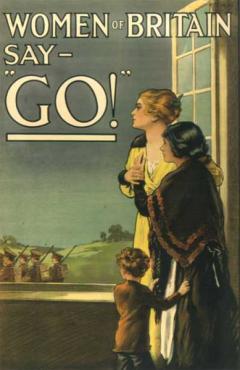




Hello Dave,
This is the first time I’m writing to you. As a Bosnian Serb (born in the US) who was raised hearing stories and seeing first hand what WW2 did to a person (my father…, concentration camp, medical experiment), I really appreciated this article. I’ve enjoyed your website a lot over the several years (?) since I’ve subscribed to it.
Keep up the great work!
Regards,
Radovan
@Radovan: Thanks, that’s always really nice to hear! I can tell you that working online, the comments typically go the other way. 😉 So one’s like yours are very refreshing!
Interesting article. Being of a certain age, I always think of Carlos Hathcock when I think of the white feather…
Very interesting! As a woman, and the wife of a man who wouldn’t be accepted into military service, I’d have smacked some of these women, too!
In an episode of “Antiques Roadshow” (UK) (Series 31, Episode 21, Dundee), a man brought along an envelope containing a letter and a white feather that had been given to his grandmother’s brother. A follow-up was shown on in Series 35 (St Andrews University).
http://www.bbc.co.uk/programmes/p0111vcp
He donated the letter to the Imperial War Museum.
“To help accomplish this goal, Fitzgerald recruited a group of 30 women”
Yeah, Emily Pankhurst and her crew.
Truly a horrible person. I believe in personal freedom and representative government but her actions were horrific. She was basically a terrorist, not just to established government but to her followers and even her own family.